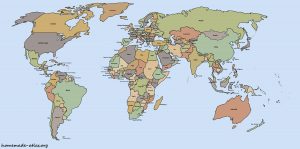 Many small to medium size businesses go to great pains to protect their intellectual property under United States law. It makes sense given that they, typically, do not sell their goods and services beyond our national frontier. So they register trademarks and patents with the United States Patent and Trademark Office (USPTO), register copyrights with the U.S. Copyright Office, and maintain their trade secrets under state and federal law. These are effective tools. But, how affective are they if a business expands into foreign markets?
Many small to medium size businesses go to great pains to protect their intellectual property under United States law. It makes sense given that they, typically, do not sell their goods and services beyond our national frontier. So they register trademarks and patents with the United States Patent and Trademark Office (USPTO), register copyrights with the U.S. Copyright Office, and maintain their trade secrets under state and federal law. These are effective tools. But, how affective are they if a business expands into foreign markets?
They are not! In a recent blog post in the Director’s Forum Blog of the USPTO, the author, Director of the Texas Regional Office of the USPTO, Hope Shimabuku points out that many businesses are surprised to learn that their U.S. patents and trademarks are not enforceable in other countries:
In fact, to their unpleasant surprise, some U.S. companies who have never done business abroad find themselves in an untenable position when foreign manufacturers copy their products, packaging, and business plans without their knowledge or authorization. Additionally, foreign counterfeiters steal product pictures, brochures, and logos from U.S. company websites and register such materials as their own.
Moreover, such business, when they expand into foreign markets, do so without adequate preparation. Many foreign bureaucracies operate more slowly so it takes time to secure trademark and patent rights in other countries. Even obtaining foreign IP protection does not guarantee that intellectual property will be protected. Companies learn the hard way when they do business in China, India, or other countries where intellectual property rights are not well respected. According to the government, the annual cost of IP theft could be as high as $600 billion.
Shimabuku explains that the “USPTO works closely with other federal agencies to protect and enforce American IP rights abroad.” She list a number of programs and resources that may interest our readers.
- The IP Attaché Program is designed to improve IP systems in other countries “for the benefit of U.S. stakeholders.” Members serve at U.S. embassies, consulates and missions for the purposes of providing training and public awareness. Importantly, attachés assist U.S. business navigate foreign laws and regulations, explain how the foreign governments work, and advice on protecting IP
- Stopfakes.gov provides tools and resources related to IP protection and provides a hotline for reporting counterfeiting
- The Science of Innovation – Anti-Counterfeitingvideo provides useful information about an innovate product authentication process
Expanding your business to other parts of the world is a big step and the watchword is “Be Prepared.” If you need help in this process, the lawyers at LWH are always eager to assist.

